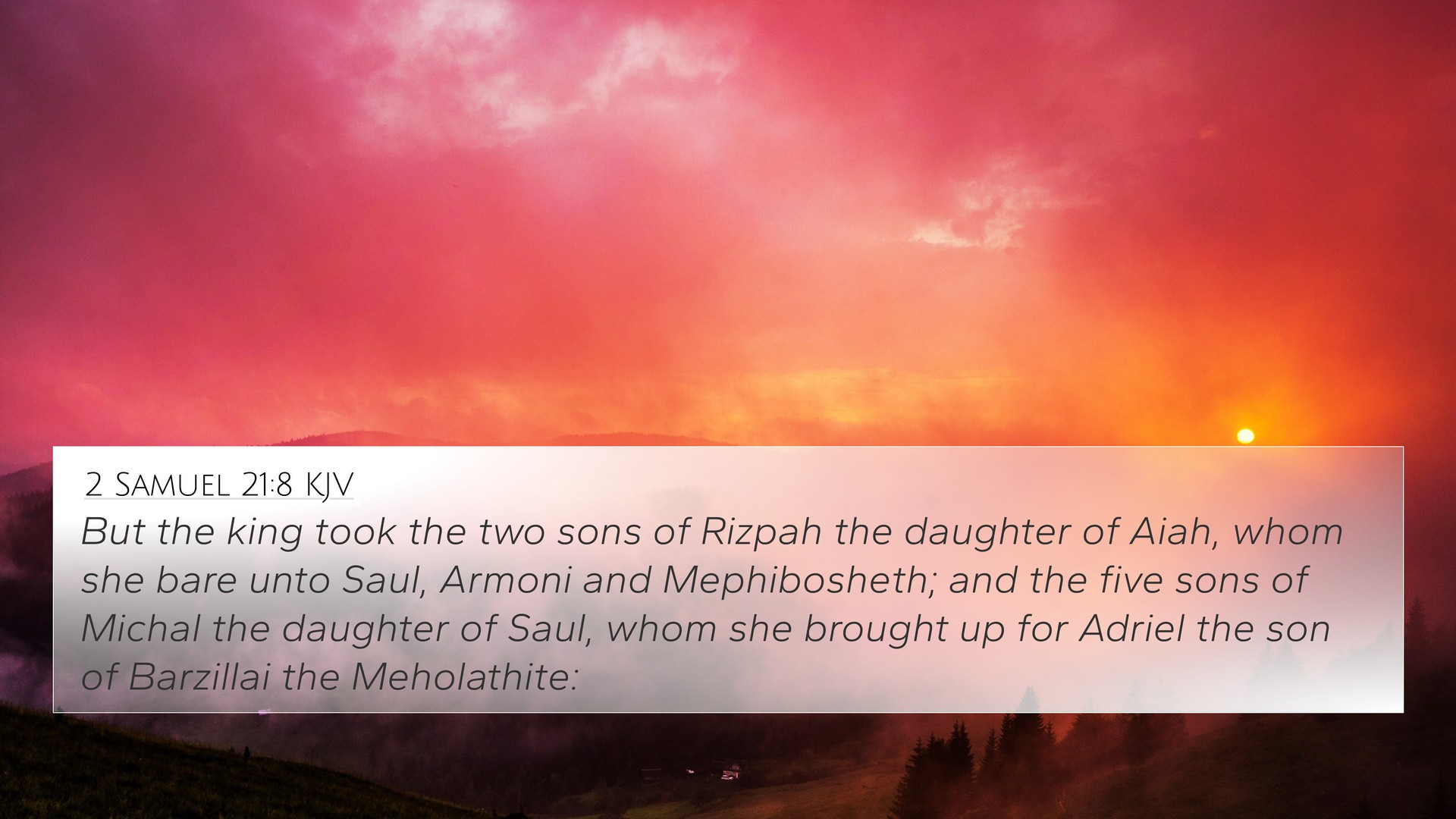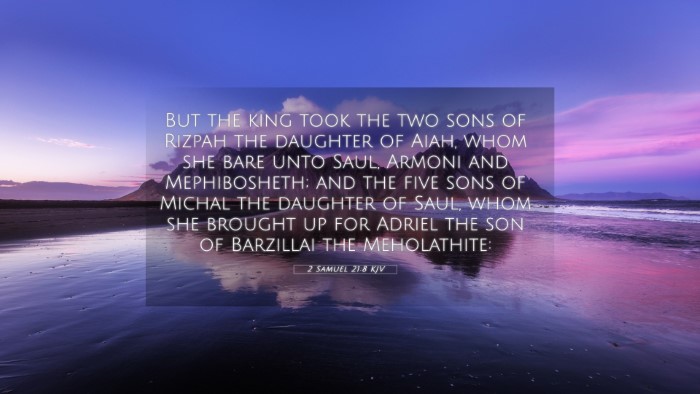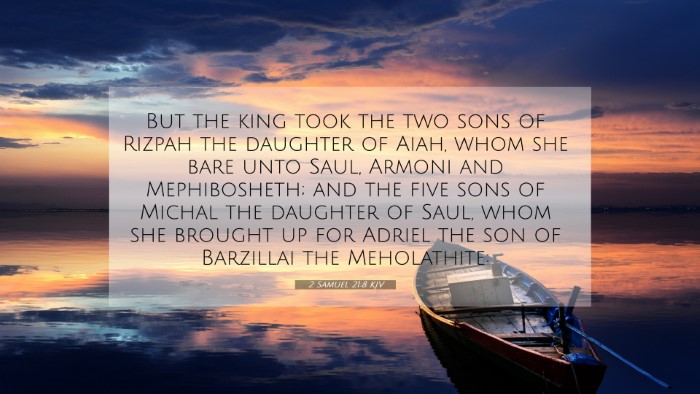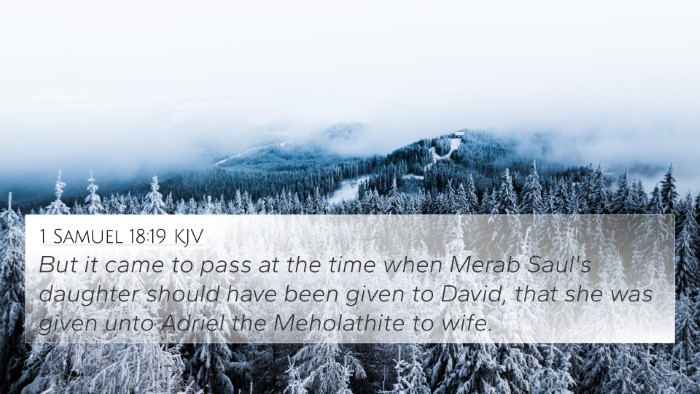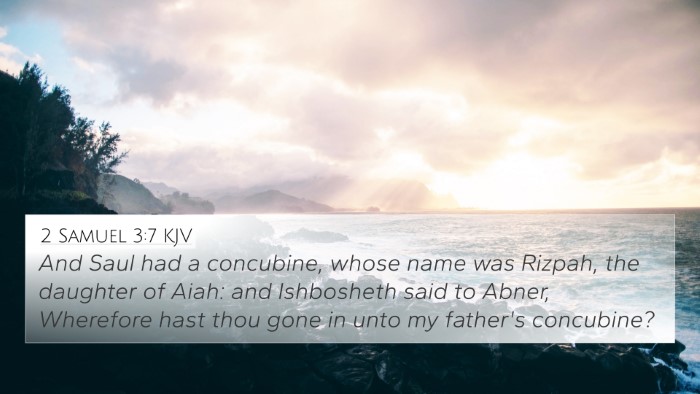Understanding 2 Samuel 21:8
2 Samuel 21:8 reads:
“But the king took the two sons of Rizpah the daughter of Aiah, whom she bare unto Saul, Armoni and Mephibosheth; and the five sons of Michal the daughter of Saul, whom she brought up for Adriel the son of Barzillai the Meholathite.”
Summary of Meaning
This verse highlights a significant episode during the reign of King David, revealing his complex relationships with the legacy of Saul and the actions taken involving Saul's descendants. The reference to Rizpah and Michal illustrates the intricate family ties and the social implications of their stories, reflecting on themes of justice, mercy, and familial loyalty in a tumultuous period of Israel's history.
Commentary Insights
Matthew Henry's Commentary
Henry points out the tragic consequences of Saul's transgressions against the Gibeonites, which led to a divine curse upon Israel. In this context, David's actions can be seen as an attempt to restore justice and atone for Saul's earlier wrongs. The mention of Rizpah, who mourned for her sons, emphasizes the deep pain associated with this story, highlighting the emotional burden of familial loyalty amid the political turmoil.
Albert Barnes' Notes
Barnes elaborates on the significance of the names mentioned. Armoni and Mephibosheth are placed in juxtaposition to the sons of Michal, bringing forth the idea of legacy and lineage. He argues that this selection demonstrates David’s sensitivity to the surviving relatives of Saul, and the choice reflects a complicated heritage that David had to navigate as he consolidated his reign.
Adam Clarke's Commentary
Clarke emphasizes the cultural backdrop of the time, noting that the actions taken by David were not merely political but also held great cultural significance. He reflects on the way families were perceived and treated, and how David was faced with a difficult decision regarding those connected to Saul, illustrating both the weight of monarchial responsibility and the impacts of past grievances on present leadership.
Thematic Connections
The verse invites several connections within the context of the Bible:
- Justice and Retribution: The events surrounding this verse can be linked to divine justice as seen in 2 Samuel 21:1 where the Gibeonites sought justice for Saul’s actions.
- The Suffering of Mothers: Rizpah's mourning is reminiscent of other maternal figures in the Bible, such as Rachel in Matthew 2:18, who weeps for her children.
- Complex Family Dynamics: The mention of Saul's descendants leads to comparisons with themes of family and loyalty seen in Romans 11:1, exploring the themes of heritage and faithfulness.
- Legacy of Saul: This is paralleled with Saul's choices leading to consequences that echo throughout 1 Samuel 15:23, emphasizing the long-term effects of disobedience to God.
- Political Intrigue: The complex relationships involving David and his predecessors can be compared to the struggles seen in 1 Kings 1:5 during the transfer of power.
- The Role of Kings: David's leadership is examined in light of his decisions regarding justice and mercy, echoed in Proverbs 16:12, underscoring his duty as a king.
- Redemption and Forgiveness: The narrative invites discussions on redemption, connecting to Isaiah 53:5, illustrating the path toward healing in the face of suffering.
Cross-References
Here are several Bible verses that relate to 2 Samuel 21:8:
- 2 Samuel 21:1 - regarding the famine and the Gibeonites.
- 1 Samuel 20:42 - the relationship between David and Jonathan, which ties back to Saul's legacy.
- 2 Samuel 4:4 - the backstory of Mephibosheth and his significance.
- 1 Chronicles 8:34 - listing descendants that relate back to Saul and the ongoing impact of these lineages.
- Galatians 6:7 - principles of sowing and reaping, applicable in the context of Saul's actions.
- Matthew 23:35 - Jesus referring to the blood of Abel and Zechariah, illustrating the cost of injustice.
- Hebrews 11:32-34 - examples of faith that emerged amid social and familial strife, linking to the theme of loyalty through adversity.
Concluding Reflections
In the context of 2 Samuel 21:8, we observe not just a historical moment but a reflection of deep spiritual truths regarding justice, family, and the burdens of leadership. The intersection of personal sacrifices and historical weight is vividly demonstrated through the lives intertwined in this passage. Understanding this verse also allows for a deeper consideration of the methods of cross-referencing and thematic linkage, enriching our study of the Scriptures.
Tools for Bible Cross-Referencing
To delve further into the connections between these Bible verses, tools for cross-referencing are essential:
- Bible concordance: A helpful resource for finding themes and connections.
- Bible cross-reference guide: Assists in identifying related passages easily.
- Bible chain references: Facilitates thematic studies across different books of the Bible.
Final Thoughts
Using a comprehensive approach to study 2 Samuel 21:8 can lead to profound insights. It encourages readers to explore the relationships and consequences woven through Scripture, allowing for a richer understanding of God’s plans and purposes across generations.
